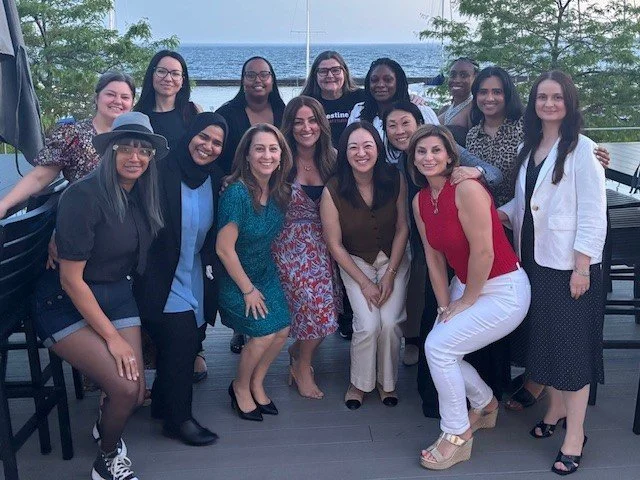We know ending abuse isn’t just about leaving. It’s about making sure you don’t have to go back. That’s why we support survivors with the safety and wraparound services needed to ensure their futures will stay from violence.
Since 1983, we’ve helped over 15,000 women, children, and gender-diverse people rebuild with dignity and independence. Today, we serve over 700 survivors each year.
Shelter is just the beginning.
Who we are
In the early 1980s, a group of fierce advocates came together to create a safe haven for people experiencing gender-based violence. Ernestine’s Women’s Shelter was one of the first shelters in Toronto to support women and their children together. We’ve since expanded our mission to include support for two-spirit, trans, non-binary, and all gender diverse survivors.
What started as a grassroots response to gender-based violence has grown into a multi-service organization offering emergency shelter, crisis counselling, legal and housing advocacy, child and youth programs, and long-term community-based supports.
Our work is free of judgment and full of care - every step of the way.
What We Do
Ernestine’s is a 32-bed emergency shelter with 14 private bedrooms, offering a safe home for adults and their children while we help them secure long-term housing. During their stay, we provide them with everything they might need - from clothing and toiletries to school supplies, baby items, prescriptions and Presto cards.
We also support 700 adults and children in the community each year through our Outreach Program. Outreach offers access to counselling, practical supporst and donation rooms.
Our programs include:
Emergency shelter - 24/ crisis housing and support
Life without violence program - counselling, safety planning and goal setting
Child and youth Services - trauma-informed support for children and teens
Outreach support - long-term case-management, housing navigation, legal advocacy, and more
Our Mission & Values
We’re driven to provide advocacy, crisis intervention, and shelter to adults and children experiencing violence, including women, Two-Spirit, trans and gender-diverse people.
We strive to create a genuinely welcoming environment for all. Our work in trauma-informed, person-centered, equity-driven and guided by our inseparable and deeply connected core values:
Compassion, respect, equity and liberation, autonomy
Our leadership and board ensure our values shape every decision we make.
Our Commitment to Equity
At Ernestine’s, we are committed to creating a safe, inclusive environment where everyone—survivors, staff, board members, volunteers, and community partners—can access our programs, work and connect without encountering Anti-Black or Anti-Indigenous racism.
We operate within an intersectional feminist, anti-racist and anti-oppressive framework, and acknowledge our role as a settler organization. We act in solidarity with Indigenous Communities and work to decolonize our practices, recognizing that indigenous sovereignty is essential to ending violence against gender-marginalized individuals
We are equally committed to confronting and dismantling Anti-Black racism within our organization and beyond by challenging systemic inequities and fostering spaces of dignity, safety, and respect.
For more details on our policies and practices, please click the button below.
A Community Approach to Healing
We know this work isn’t ours alone. It takes a network of dedicated community members, donors, partners, and volunteers to deliver the lifesaving and life-changing services survivors deserve.
When you support Ernestine’s, you’re helping build a safer, stronger, and more compasionate community for everyone.
Resources and Learning
Want to better understand gender-based violence? Looking for resources to support someone in your life?
Our blog offers education, insights, and updates from our team.
Strategic Priorities
In 2024, Ernestine’s began a new strategic planning process to shape the future of our services and operations. We identified these priorities through a rigorous, consultative process. Our priorities are:
Pursuing service excellence
Improving access
Cultivating a values-centered culture
Growing and diversifying funding
These strategic priorities build on the success of our 2025-2028 plan, guide our program planning and help our team focus resources where they’re needed most.
Everyone deserves a life free from violence.
Have questions about how you can support survivors?
We’re here to help.



